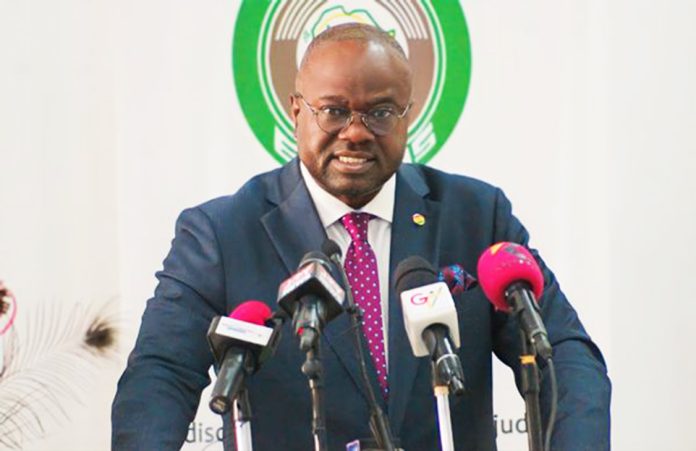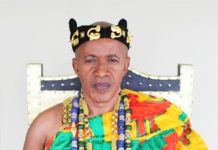The Minority in Parliament has described President John Dramani Mahama’s recent engagement with selected Civil Society Organisations (CSOs) on illegal mining as nothing more than a “publicity gimmick” aimed at covering up what it calls the government’s “failed attempts” at dealing with the galamsey menace.
In a statement issued by Kwaku Ampratwum-Sarpong, Member of Parliament for Mampong and Ranking Member on the Lands and Natural Resources Committee, the Minority said the so-called CSO encounter was “a publicity stunt calculated to cover up the Government’s failed attempts at dealing with illegal mining.”
The statement expressed disappointment that despite worsening environmental conditions, including the browning of water bodies, soil contamination and destruction of forest reserves, President Mahama could “look into the eyes of Ghanaians and tell us he is winning the fight against illegal mining.”
According to the Minority, the illegal mining situation has kept worsening by the day, contrary to claims by the government that it is making progress.
It cited findings from a joint report by Pure Earth and the Environmental Protection Authority (EPA), which confirmed heavy contamination of soils and food crops across the country.
“It is obvious that the galamsey menace keeps worsening by the day. We are, therefore, surprised that amid increasing turbidity levels and the glaring browning of our water bodies, the heavy contamination of soils and food crops, the wanton destruction of our forest resources and the indiscriminate degradation of our lands, the President of the Republic could look into the eyes of Ghanaians and tell us he is winning the fight against illegal mining,” the statement said.
The Minority further accused the Mahama-led government of lacking the political will to address the crisis, arguing that the administration has resorted to renaming policies and programmes introduced by the previous Akufo-Addo government, instead of implementing real reforms.
“Without a doubt, this Government lacks the political will to fight galamsey and has merely resorted to the renaming of policies and programmes introduced by the Akufo-Addo Government,” the statement noted.
It recalled that when the Akufo-Addo administration took office in 2017, the galamsey menace had reached alarming levels, prompting warnings that Ghana could soon be forced to import water if the trend continued.
To confront the issue, the previous government implemented a six-month moratorium on small-scale mining activities — both legal and illegal — which was later extended to a total of 18 months.
During that period, the statement highlighted the Akufo-Addo government introduced several initiatives, including the establishment of the Inter-Ministerial Committee on Illegal Mining (IMCIM) to coordinate the fight against galamsey and the launch of Operation Vanguard to rid water bodies and forest reserves of illegal mining activities.
Additionally, the government partnered with the George Grant University of Mines and Technology (UMaT), Tarkwa, to train 4,000 small-scale miners on responsible and environmentally-sound mining practices and amended the Minerals and Mining Act, 2006 (Act 703), to enhance punishments for mining-related offences.
“These measures helped the then Government to come to grips with the illegal mining menace,” the Minority’s statement said, adding that the Akufo-Addo administration “adopted a two-pronged approach combining law enforcement with regulatory, operational and policy reforms.”
Among the law enforcement measures outlined were the declaration of water bodies as Red Zones for all mining activities and a ban on reconnaissance and exploration in forest reserves except under exceptional circumstances.
The statement noted that, these restrictions remained in place until the Akufo-Addo government left office and have now been rechristened as security zones.
It also mentioned the introduction of Operation Halt II, in partnership with the Ministry of Defence, to rid river bodies and forest reserves of illegal mining, the acquisition of five speed boats for the Ghana Navy and the training of 200 river guards to protect water bodies.
“These guards were not deployed before leaving office, but have now been deployed and renamed Blue Water Guards,” the Minority observed.
Other measures cited included the recruitment of additional mine inspectors, establishment of small-scale mining committees in all 83 mining districts, and the passage of the Minerals and Mining (Minerals Operation – Tracking of Earthmoving and Mining Equipment) Regulations, 2020 (L.I. 2404), which introduced tracking devices for mining machinery.
The statement also mentioned the establishment of a control room at the Minerals Commission to monitor mining equipment movements and the organisation of training sessions for judges in mining areas to ensure strict enforcement of the law.
In addition to law enforcement, the Minority recalled several policy and regulatory interventions by the previous government, including the revamping of the Community Mining Scheme, introduction of mercury-free gold processing technology (Gold Kacha) and decentralisation of the Minerals Commission to improve accessibility and monitoring.
Other reforms listed were the creation of the Small-Scale Miners Award Scheme, the introduction of online applications for small-scale mining licenses, and the National Alternative Employment and Livelihood Programmes (NAELP), which have now been renamed Responsible Cooperative Mining and Skills Development Programme (rCOMSDEP).
The statement maintained that the current government’s approach has been largely cosmetic and has failed to address the root causes of illegal mining.
“It is becoming increasingly clear that the Government of President Mahama has failed to demonstrate the level of resolve required to address the galamsey crisis in a comprehensive and effective manner,” the Minority said.
It warned that as a result of government’s inaction, the nation now faces “escalating health and environmental dangers,” including dangerously high turbidity levels in rivers, contamination of food and water, degradation of forest reserves and destruction of railway lines in mining zones.
“Turbidity levels in our rivers are now dangerously high, vital organs of citizens are being irreparably damaged by contaminated food and water, railway lines have become unsafe, and our forest reserves are being degraded into mining enclaves,” the statement noted.









